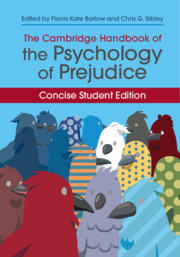Description
The Cambridge Handbook of the Psychology of Prejudice
Concise Student Edition
Cambridge Handbooks in Psychology Series
Coordinators: Barlow Fiona Kate, Sibley Chris G.
This concise student edition of The Cambridge Handbook of the Psychology of Prejudice includes new pedagogical features and instructor resources.
Language: English
Subject for The Cambridge Handbook of the Psychology of Prejudice:
The Cambridge Handbook of the Psychology of Prejudice
Publication date: 10-2018
458 p. · 17.8x25.3 cm · Hardback
Publication date: 10-2018
458 p. · 17.8x25.3 cm · Hardback
The Cambridge Handbook of the Psychology of Prejudice
Publication date: 10-2018
458 p. · 17.5x24.7 cm · Paperback
Publication date: 10-2018
458 p. · 17.5x24.7 cm · Paperback
Description
/li>Contents
/li>Biography
/li>
The Cambridge Handbook of the Psychology of Prejudice: Concise Student Edition aims to answer the questions: why is prejudice so persistent? How does it affect people exposed to it? And what can we do about it? With cutting-edge research from top scholars in the field, the chapters present an overview of psychological models of prejudice and investigate key domains such as racism, sexism, and the criminal justice system. This student edition of the award-winning Handbook includes new pedagogical features such as learning objectives, core terms and definitions, summary points, discussion questions, recommended reading, and an instructor's test bank. It also features a new conclusion chapter that analyzes eight hard problems currently faced by researchers and activists, thus engaging students in deep, forward-thinking discussion. Developed specifically for use in Psychology of Prejudice courses at the undergraduate and graduate levels, the Concise Student Edition is an essential teaching and learning resource.
Preface; 1. What is prejudice? An introduction Chris G. Sibley and Fiona Kate Barlow; Part I. General Theoretical Perspectives: 2. Intergroup discrimination: ingroup love or outgroup hate? Marilynn B. Brewer; 3. Evolutionary approaches to stereotyping and prejudice Oliver Sng, Keelah E. G. Williams and Steven L. Neuberg; 4. Understanding the nature, measurement, and utility of implicit intergroup biases Kumar Yogeeswaran, Thierry Devos and Kyle Nash; 5. Social dominance theory: explorations in the psychology of oppression Jim Sidanius, Sarah Cotterill, Jennifer Sheehy-Skeffington, Nour Kteily and Héctor Carvacho; 6. The dual process motivational model of ideology and prejudice John Duckitt and Chris G. Sibley; 7. Is prejudice heritable? Evidence from twin studies Fiona Kate Barlow, James M. Sherlock, and Brendan P. Zietsch; 8. Recent developments in intergroup contact research: affective processes, group status, and contact valence Linda R. Tropp, Agostino Mazziotta and Stephen C. Wright; 9. From prejudice reduction to collective action: two psychological models of social change (and how to reconcile them) John Dixon, Kevin Durrheim, Clifford Stevenson and Huseyin Cakal; 10. It's all about ignorance: reflections from the blue-eyed/brown-eyed exercise Jane Elliott; Part II. Prejudice in Specific Domains: 11. Aversive racism and contemporary bias John F. Dovidio, Samuel L. Gaertner and Adam R. Pearson; 12. Stereotypicality biases in the criminal justice system Danny Osborne, Paul G. Davies and Shirley Hutchinson; 13. Prejudice against immigrants in multicultural societies Colleen Ward, Agnes Szabo and Jaimee Stuart; 14. Ambivalent sexism in the twenty-first century Rachel A. Connor, Peter Glick and Susan T. Fiske; 15. Sexual prejudice: advances in conceptual and empirical models V. Paul Poteat and Michelle Birkett; 16. Where do we go from here? The eight hard problems facing the scientific study of prejudice and its reduction Fiona Kate Barlow and Chris G. Sibley; Index.
Fiona Kate Barlow is an Australian Research Council Future Fellow at the School of Psychology, the University of Queensland, Australia. She is a social psychologist specializing in the study of race relations, with a particular focus on how the small interracial interactions that we have shape our racial attitudes and behaviors. From 2012 to 2014 Barlow held an Australian Research Council early career fellowship, and in 2017 she was the chief scientist on the critically acclaimed documentary The Truth About Racism. She is also the recipient of the 2013 Society for Australasian Social Psychology Early Career Researcher Award, and multiple teaching and postgraduate supervision awards.
Chris G. Sibley is a professor of psychology at the University of Auckland, New Zealand. He is a social psychologist and the founder of the New Zealand Attitudes and Values Study (NZAVS), a twenty-year longitudinal national probability study of social attitudes, personality, and health outcomes across New Zealand. As an author of over 200 peer-reviewed articles and book chapters, he was identified as a 'Rising Star' by the Association for Psychological Science in 2011 and received the Erik Erikson Early Career Award in 2014 from the International Society of Political Psychology. He is a long-time collaborator of Dr Fiona Kate Barlow.
Chris G. Sibley is a professor of psychology at the University of Auckland, New Zealand. He is a social psychologist and the founder of the New Zealand Attitudes and Values Study (NZAVS), a twenty-year longitudinal national probability study of social attitudes, personality, and health outcomes across New Zealand. As an author of over 200 peer-reviewed articles and book chapters, he was identified as a 'Rising Star' by the Association for Psychological Science in 2011 and received the Erik Erikson Early Career Award in 2014 from the International Society of Political Psychology. He is a long-time collaborator of Dr Fiona Kate Barlow.
© 2024 LAVOISIER S.A.S.




